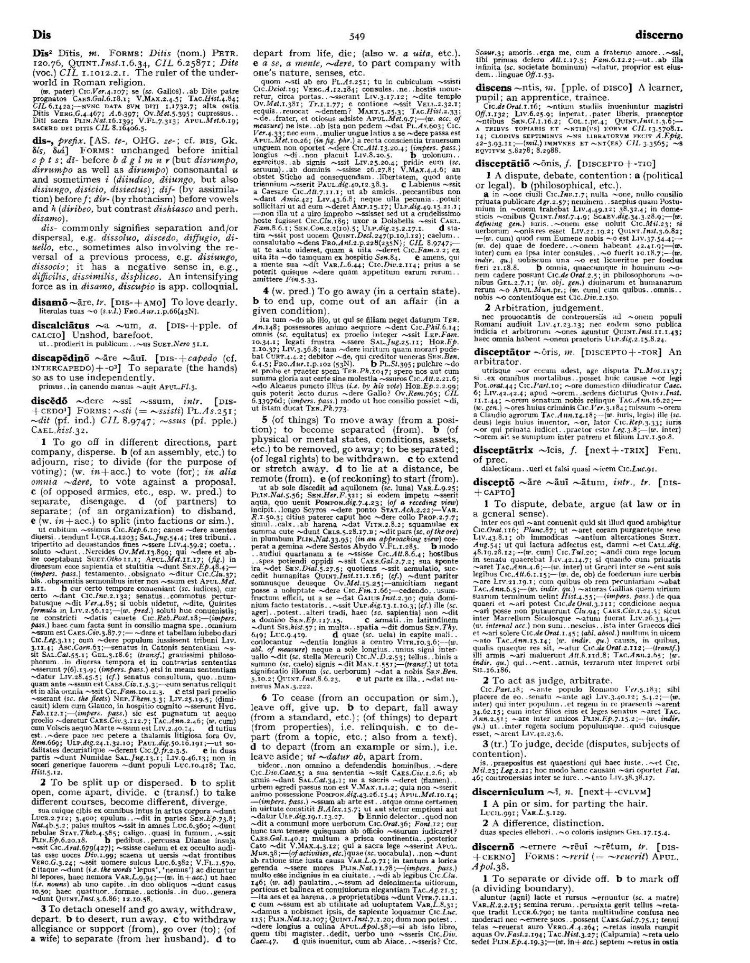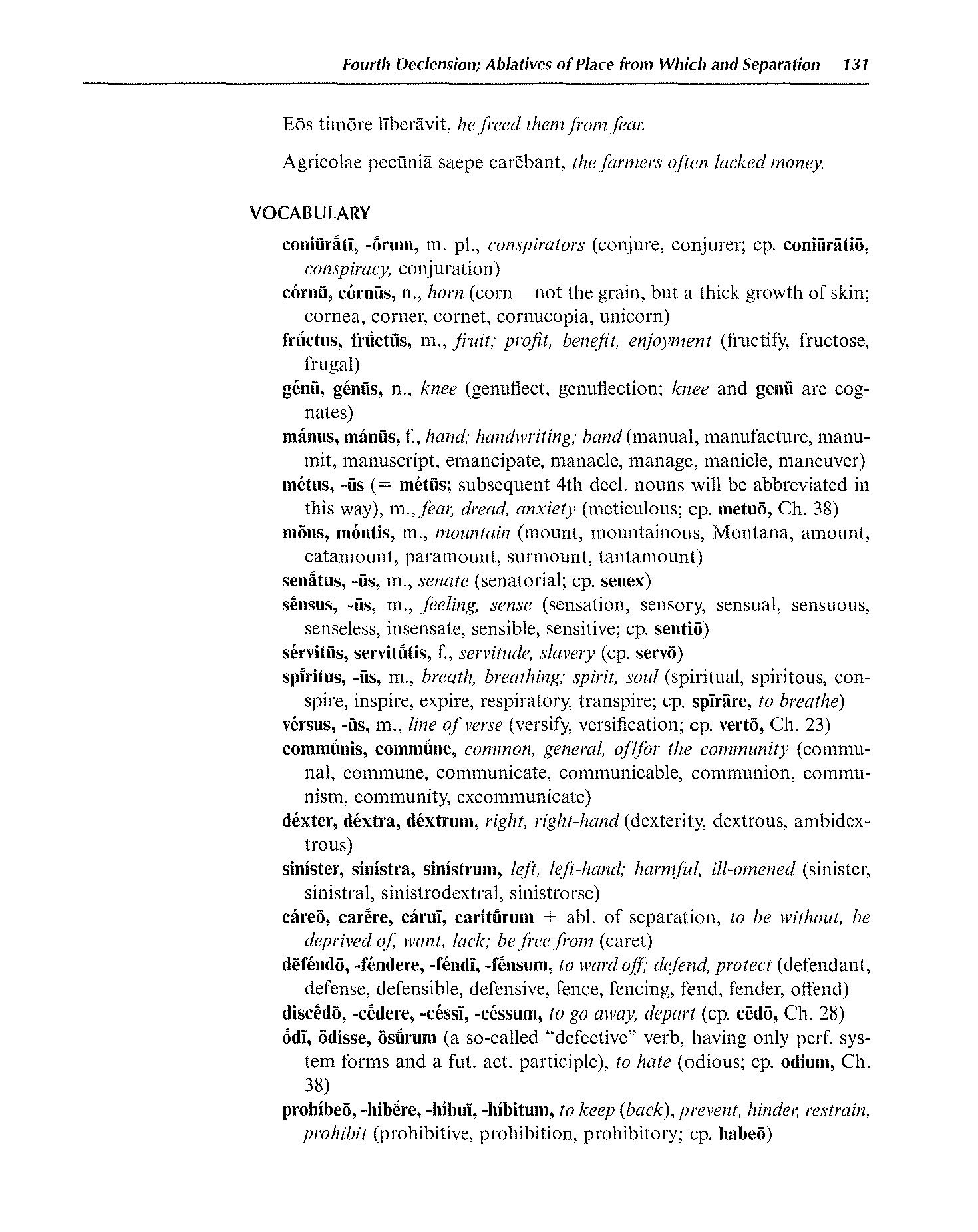
page_listing.tpl
page_subListingDetails.tpl
sub_listingDetails_style1.tpl
sub_listingDetails.title.tpl
discēdere to depart
discēdere is a Latin Verb that primarily means to depart.
Definitions for discēdere
Wheelock's Latin
Verb
- 1
to go away, depart
Oxford Latin Dictionary
Verb
- 1
To go off in diferent directions, part company, disperse. (b) (of an assembly, etc.) to adjourn, rise; to divide (for the purpose of voting); (w. in+acc) to vote (for); in alia omnia ~dere, to vote against a proposal. (c) (of opposed armies, etc., esp. w. pred.) to separate, disengage. (d) (of partners) to separate; (of an organization) to disband. (e) (w. in+acc.) to split (into factions or sim.).
- 2
To split up or dispersed. (b) to split open, come apart, divide. (c) (transf.) to take different courses, become different, diverge.
- 3
To detach oneself and go away, withdraw. depart. (b) to desert, run away. (c) to withdraw allegiance or support (from), go over (to); (of a wife) to separate (from her husband). (d) to depart from life, die; (also w. a uita, etc.). (e) a se, a mente, ~dere, to part company with one's nature, senses, etc.
- 4
(w. pred.) To go away (in a certain state). (b) to end up, come out of an affair (in a given condition).
- 5
(of things) To move away (from a position); to become separated (from). (b) (of physical or mental states, conditions, assets, etc.) to be removed, go away; to be separated; (of legal rights) to be withdrawn. (c) to extend or stretch away. (d) to lie at a distance, be remote (from). (e) (of reckoning) to start (from).
Sentences with discēdere
Latin to English
Haec verba fēlīcia vōbīs dīcō nē discēdātis.Compare I say these happy words to you so that you may not depart.
Nōlī discēdere, mī amīce.Compare Do not leave, my friend.
Nōbīs necesse est statim discēdere. Compare It is necessary for us to leave immediately.
Ille discedo; ego somnus solvo.Compare He departed; I awoke.
Ita tum ille discedo iratus; puto ego tu narro.Compare So he then went away in anger; I think that I have told you.
In is profecto locus discedo, quo ego ipse venio.Compare He has departed indeed to those places to which I myself must come.
Conjugation table for discēdere
Cactus2000
| ACTIVE | |
| Indicative present | Indicative imperfect |
| discēdō discēdis discēdit discēdimus discēditis discēdunt | discēdēbam discēdēbās discēdēbat discēdēbāmus discēdēbātis discēdēbant |
| Indicative perfect | Indicative pluperfect |
| discessī discessistī discessit discessimus discessistis discessērunt / discessēre | discesseram discesserās discesserat discesserāmus discesserātis discesserant |
| Indicative future | Indicative future perfect |
| discēdam discēdēs discēdet discēdēmus discēdētis discēdent | discesserō discesseris discesserit discesserimus discesseritis discesserint |
| Subjunctive present | Subjunctive imperfect |
| discēdam discēdās discēdat discēdāmus discēdātis discēdant | discēderem discēderēs discēderet discēderēmus discēderētis discēderent |
| Subjunctive perfect | Subjunctive pluperfect |
| discesserim discesseris discesserit discesserimus discesseritis discesserint | discessissem discessissēs discessisset discessissēmus discessissētis discessissent |
Infinitive present discēdere Infinitive perfect discessisse Infinitive future discessūrum esse | Imperative present discēde discēdite Imperative future discēditō discēditō discēditōte discēduntō |
| PASSIVE | |
| Indicative present | Indicative imperfect |
| discēdor discēderis discēditur discēdimur discēdiminī discēduntur | discēdēbar discēdēbāris / discēdēbāre discēdēbātur discēdēbāmur discēdēbāminī discēdēbantur |
| Indicative perfect | Indicative pluperfect |
| discessus sum discessus es discessus est discessī sumus discessī estis discessī sunt | discessus eram discessus erās discessus erat discessī erāmus discessī erātis discessī erant |
| Indicative future | Indicative future perfect |
| discēdar discēdēris / discēdēre discēdētur discēdēmur discēdēminī discēdentur | discessus erō discessus eris discessus erit discessī erimus discessī eritis discessī erunt |
| Subjunctive present | Subjunctive imperfect |
| discēdar discēdāris / discēdāre discēdātur discēdāmur discēdāminī discēdantur | discēderer discēderēris / discēderēre discēderētur discēderēmur discēderēminī discēderentur |
| Subjunctive perfect | Subjunctive pluperfect |
| discessus sim discessus sīs discessus sit discessī sīmus discessī sītis discessī sint | discessus essem discessus essēs discessus esset discessī essēmus discessī essētis discessī essent |
Infinitive present discēdī Infinitive perfect discessum esse Infinitive future discessum īrī | Imperative present discēdere discēdiminī Imperative future discēditor discēditor - discēduntor |
| PARTICIPLE | ||
| Participle present active | ||
| Nom. | discēdēns | discēdentēs |
| Gen. | discēdentis | discēdentium |
| Dat. | discēdentī | discēdentibus |
| Acc. | discēdentem | discēdentēs |
| Abl. | discēdente | discēdentibus |
| Participle future active | ||
| Nom. | discessūrus | discessūrī |
| Gen. | discessūrī | discessūrōrum |
| Dat. | discessūrō | discessūrīs |
| Acc. | discessūrum | discessūrōs |
| Abl. | discessūrō | discessūrīs |
| Participle perfect passive | ||
| Nom. | discessus | discessī |
| Gen. | discessī | discessōrum |
| Dat. | discessō | discessīs |
| Acc. | discessum | discessōs |
| Abl. | discessō | discessīs |
| Gerundive | ||
| Nom. | discēdendus | discēdendī |
| Gen. | discēdendī | discēdendōrum |
| Dat. | discēdendō | discēdendīs |
| Acc. | discēdendum | discēdendōs |
| Abl. | discēdendō | discēdendīs |
| Gerund | Supine | |
| Nom. | discēdere | discessum |
| Gen. | discēdendī | discessū |
| Dat. | discēdendō | |
| Acc. | discēdendum | |
| Abl. | discēdendō | |
Data sources
Notes
- Definitions
- Frederick M. Wheelock, Wheelock's Latin, 6th ed., rev. Richard A. LaFleur (New York, NY: HarperCollins Publishers, 2005): 131.
- P. G. W. Glare, Oxford Latin Dictionary, Vols. 1-8 (Oxford: Clarendon Press, 1982): 549.
- Word frequencies
- Christopher Francese, "Latin Core Vocabulary," Dickinson College Commentaries, last modified 2014, http://dcc.dickinson.edu.
- Paul B. Diederich, The Frequency of Latin Words and Their Endings, PhD diss., (Columbia University, 1939).
- Louis Delatte, Suzanne Govaerts, Joseph Denooz, and Etienne Evrard, Dictionnaire fréquentiel et index inverse de la langue latine [Frequency Dictionary and Inverse Index of the Latin Language] (Liège, Belgium: Laboratoire d'analyse statistique des langues anciennes de l'Université de Liège [L.A.S.L.A.], 1981): 124.
Bibliography
Allen, Joseph H. Allen and Greenough's New Latin Grammar for Schools and Colleges: Founded on Comparative Grammar. Edited by James B. Greenough, George L. Kittredge, Albert A. Howard, and Benjamin L. D'Ooge. Boston, MA: Ginn & Company, 1903.
Crystal, David. A Dictionary of Linguistics and Phonetics. 6th ed. Oxford, UK: Blackwell Publishing, 2008.
Delatte, Louis, Suzanne Govaerts, Joseph Denooz, and Etienne Evrard. Dictionnaire fréquentiel et index inverse de la langue latine [Frequency Dictionary and Inverse Index of the Latin Language]. Liège, Belgium: Laboratoire d'analyse statistique des langues anciennes de l'Université de Liège (L.A.S.L.A.), 1981.
Diederich, Paul B. The Frequency of Latin Words and Their Endings. PhD diss., Columbia University, 1939.
Francese, Christopher. "Latin Core Vocabulary." Dickinson College Commentaries. Last modified 2014. http://dcc.dickinson.edu/latin-vocabulary-list.
Gildersleeve, Basil L., and Gonzales Lodge. Gildersleeve's Latin Grammar: Third Edition, Revised, and Enlarged. 3rd ed. London, England: Macmillan and Co., 1903.
Glare, Peter G.W. Oxford Latin Dictionary. Vols. 1-8. Oxford, England: Clarendon Press, 1982.
Krüger, Bernd. "Latin Conjugation Tables." Cactus2000. Accessed May 5, 2023. https://latin.cactus2000.de/index.en.php.
Pierson, Nick. "Sound of Text." Accessed October 26, 2019. https://soundoftext.com.
Wheelock, Frederick M. Wheelock's Latin. 6th ed. Revised by Richard A. LaFleur. New York, NY: HarperCollins Publishers, 2005.
Wiktionary Contributors. "Victionarium." Wikimedia Foundation, Inc. Updated March 18, 2019. https://la.wiktionary.org/wiki/Victionarium:Pagina_prima.
Citation
Chicago (17th ed.)
Allo Contributors. "discēdō, discēdere, discessī, discessum (v.) - Latin Word Definition." Allo Latin Dictionary. Last modified . Accessed January 30, 2026. http://ancientlanguages.org/latin/dictionary/discedo-discedere-discessi-discessum.
Entry created on . Last updated on .







